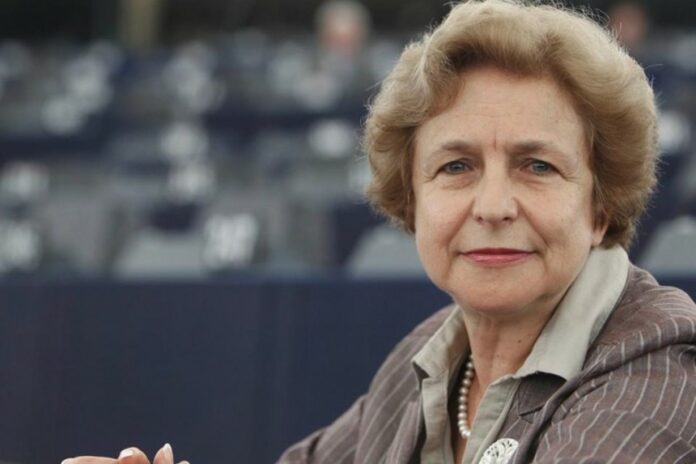This article on the developments of the case of T. Zhadnok was published on one of the Latvian news websites.
Tatjana Zhdanok is a former MEP, who represented Latvia in the European Parliament during 14 years, but at this moment she is deprived of the right to participate in national elections.
‘She is too active!’ Latvian court does not allow Tatyana Zhdanok run for the parliament elections
Tatyana Zhdanok (Tatjana Ždanoka) defends the interests of her electorate too actively and threatens Latvia by something, what is a secret, considers the Administrative District Court.
RIGA, Sep 4 – Sputnik, Andrey Solopenko. The Administrative District Court considered Tatyana Zhdanok’s appeal and upheld the decision of the Central Election Commission (CEC) to delete her from the list of candidates for acts allegedly threatening Latvia’s independence.
The Constitutional Court (CC) of Latvia upheld the ban on Tatyana Zhdanok to run for municipal and parliamentary elections, as she was in the Communist Party of Latvia after January 13, 1991. At the same time, the Constitutional Court noted that this prohibition can be applied if the person still poses a threat to the core values of a democratic rule-of-law state. The court left the final decision for the CEC.
To do this, the CEC requested additional information from the Security Police (SP) and the Bureau for the Protection of the Constitution (BPC) and, having inspected it, decided to exclude Zhdanok from the candidate lists. However, according to the law, the decision of the CEC can be appealed in the Administrative District Court, which Tatyana did not fail to take advantage of.
Evaluation of political activity
In her speech before the court Zhdanok noted that the CEC had not taken into account the verdict of the Grand Chamber of the European Court of Human Rights (ECHR) on her case, where it was directly stated that ‘her current actions are not an essential condition, taking into account the fact that the contested measure refers only to her political attitudes during the struggle of Latvia for democracy through independence in 1991.’
Thus, according to Zhdanok, the CEC had to assess whether the fact that she was a member of the Communist Party in 1991 still represented a threat to Latvia; nevertheless, this decision of the ECHR was completely ignored by the Central Electoral Commission and the intelligence services that provided information. Zhdanok stressed that the intelligent services had assessed her current political activity, in particular.

Background
Tatyana Zhdanok (Tatjana Ždanoka) a former professor of mathematics in Latvian University in 70-80’s. In the same time period she joined a Latvian Communist party, was an ordinary member of a party, not taking any positions.
In the late 80’s she began to act in politics, was elected as a member of Riga City Council and later in 1990 became a member of the Supreme Council of Soviet Latvia. Tatyana Zhdanok joined the opposition unionist group in the parliament. She personally campaigned for the against the destruction of the higher education in Russian language on the territory of Latvia.
In 1991 Latvian Communist party fell in opposition. In January 1991 the leaders of Communist party made some radical appeals against Latvian authorities; the situation led to violent conflicts between the supporters of independence and their opponents. Nevertheless, after these actions the Communist Party remained a legal political organisation.
Tatyana was elected in the Audit committee of the Latvian Communist party and as a member participated in two meetings of the Committee during the summer of 1991. According the laws of that time her activity within party was absolutely legal.
After the restoration of Latvian independence Tatyana Zhdanok became the chair of the oppositional group of the national parliament, and had her MP mandate till the end of the legislature in 1993.
In 1997 T. Zhdanok was elected as a member of Riga City Council. When she had started actively campaign against the corruption in the municipality, the ruling politicians submitted a draft law to the national parliament aimed to deprive Tatyana of the political rights. This law was adopted in 1999 and it set a prohibition to participation in elections for those former Communist party members, who remained active in the party after January 1991. According to the position of Latvian courts Tatyana was deprived of her mandate in the Riga municipal Council and lost the right to be elected to both the national parliament or any municipality of Latvia only because she had participated in the two meetings of the Audit committee in 1991.
Tatyana Zhdanok challenged this ban in Latvian courts and then in the European Court of Human Rights. She won the court case in 2004. But Latvia filed an appeal on this decision to the Grand Chamber of the European Court of Human Rights on the grounds that ‘Latvia’s emergence from totalitarian rule brought about by the occupation of Latvia had not been sufficiently taken into account’ On March 16, 2006, the court decided that Zhdanok’s rights had not been violated. At the same time the court rejected to examine the political activity of Tatyana Zhdanok after the restoration of the independence. The Court also called the Latvian legislature to ‘work actively on abolishing such a restrictions’.
During the following years Latvian Government didn’t even try to discuss the abolition of the restriction. The new court decision depriving T. Zhdanok the right to candidate on the ongoing national parliament elections, which will take place on the 6-th of October, will also be challenged in the ECHR. The decision of Latvian court is grounded solely on the secret reports of the state intelligence services, which are not published. Even Tatyana herself was not acquainted with the content of the reports.




















